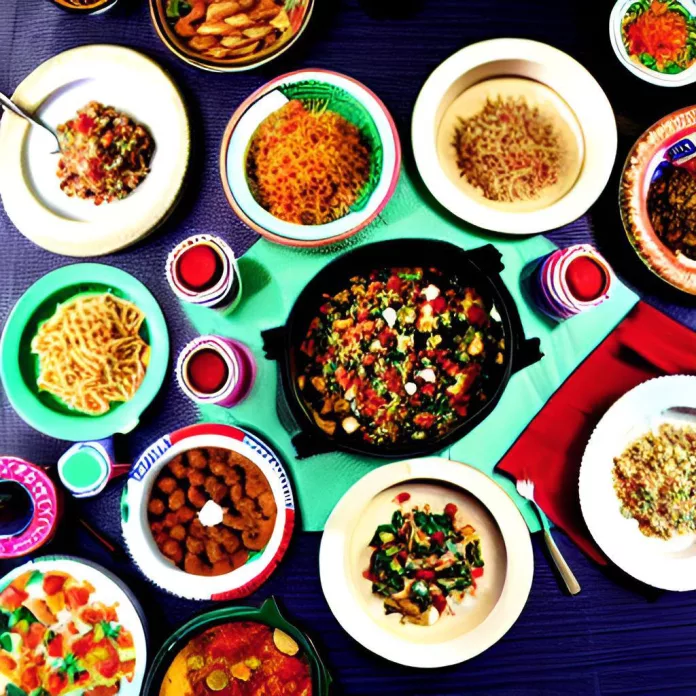Ramadan was always that time of the year my family and I always looked forward to—the holy month of devotion, sincerity, prayer, and fasting for Muslims around the world. For Muslims, this was an entire month of spirituality. As a young Muslim child, celebrating the holy month was always full of excitement. This meant my sister, and I would decorate our home with wall decor and lights and always have our Ramadan aprons ready to help our mom in the kitchen. It also meant extra bedtime stories and more learning sessions about the great prophets from my dad. Preparing for Ramadan meant spiritually and mentally preparing the month before so we could enjoy Ramadan to its fullest in prayers, devotion, and sincerity to Allah. And every Ramadan closed with the festive celebration of Eid.
I recall one of my Ramadan days, in 2002, coinciding with the American holiday of Thanksgiving. I was in elementary school then, in the Midwest. Wichita, Kansas. My teacher had asked each student in class to bring an item for our class Thanksgiving potluck. I was a bit unsure of what I should bring. Should I choose something more American? Or go the more traditional Bengali route, as my family was from Bangladesh. It was hard to decide since there was very little to no diversity in the school and city where I was growing up. In fact, I was the only one of two visible Muslims in our entire school and one of the few practicing Muslim children in the neighborhood.
So, I gave it some thought and asked my mom if she could cook traditional Bengali food for the potluck. Now, my mom cooked fantastic food! But, in a way, I was a little embarrassed by the food I would take to class, wondering if my classmates would think I was weird. Curry was so foreign to them then that any student of Indian-subcontinent descent who took curry or curry chicken to school for lunch would be made fun of or bullied. The kids would call our curry chicken “chicken poop,” which was very hurtful. So, you can imagine all the thoughts roaming in my head. Would they call any items I took to the potluck “curry poop?”.
My mom was smart; she didn’t make heavy curry dishes for the potluck. She was aware that many people would not be spice tolerant. So instead, she made delicious samosas and pakoras with authentic Bengali flavors, so accepting the dish would be easier for everyone in the class to eat.
My mom fried and heated the appetizers the following day before I went to school. I waited for the feast time in school, curious about what my classmates and teacher would think of the food. To my surprise, everyone loved the flavors of the potluck dishes I took to school. The dishes were spicy and very flavorful. It felt great knowing everyone enjoyed the taste. Unfortunately, I didn’t eat during the potluck as I was fasting. Fortunately, my teacher packed food for me, and I told her that I could only take non-meat items as the students and school did not fully understand my halal diet.
After that day, my classmates would frequently ask me about the types of food I ate at home and if I could share more of my culture and teach it to them. My teacher, on some occasions, would request me to ask my mom for her recipes.
Who knew a simple class potluck would bring my classmates more accepting of my culture? It was a great Ramadan experience, and I realized then that this was one of the blessings of Ramadan which Allah had showered upon me. And I remember that night after I went home from school, I prayed extra prayers to thank Allah to express my gratitude. I thanked him for allowing a simple potluck to help me better integrate my culture with the school. And trust me, as a kid, it is not easy to go through bullying for the food you eat for cultural or religious reasons.
As Ramadan ended that year, I felt a sense of growing spirituality, joy, and sadness. I was already looking forward to next year. I tried not to let negative thoughts get to me and spent more time with my family to learn more about my cultural and religious traditions. I also helped my mom in the kitchen the day before the big Eid celebration and prepared some delicious meals for the big day. In addition, I tried to help my dad with some house chores, like mowing the lawn.
On the big day of celebration, Eid Al-Fitr, I would first wake up at 5 am and shower. I could still hear my mom cook in the kitchen. Then, I would wear my new dress and perfume myself with a lovely scent. My sister and I would race shortly after we were ready in our new dresses to say ‘salaam’ to our parents to see who would get the Eid money first. That was always fun. When my mom was finished cooking, and my dad had finished polishing the house, they would also get ready in their new outfits; we would go to Eid prayer at the masjid and start our day of celebration. As a kid, I sometimes wondered how I could share these experiences with my classmates as they missed out on all the great things. I wish my classmates knew there was so much more to my religion and culture than those delicious samosas and pakoras I took to that Thanksgiving potluck.
